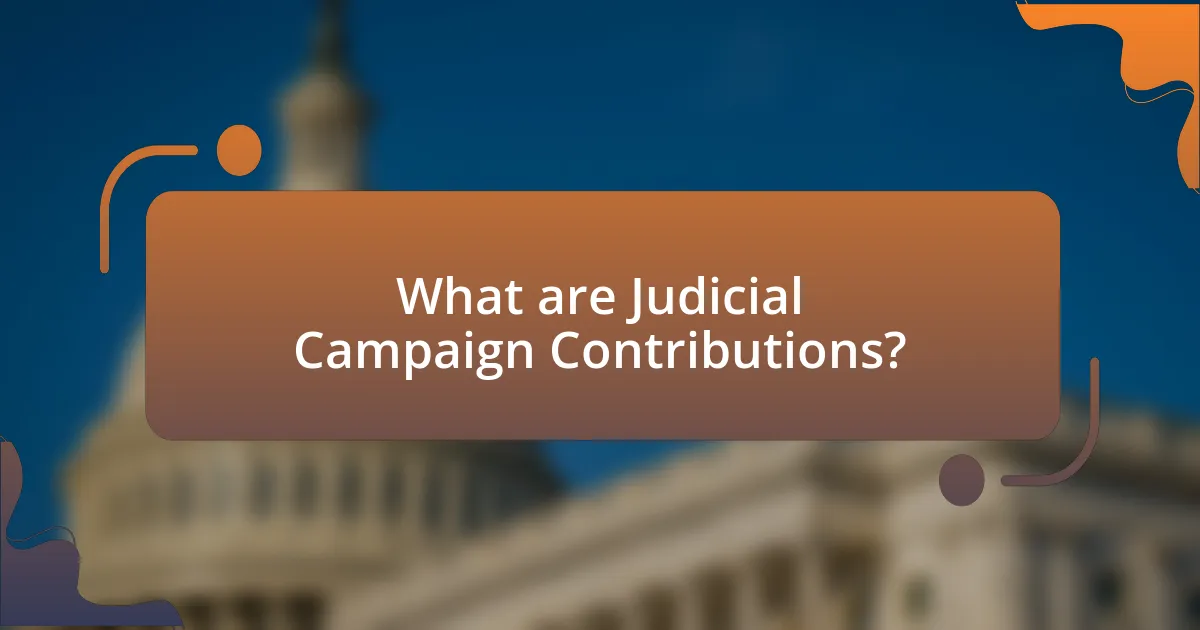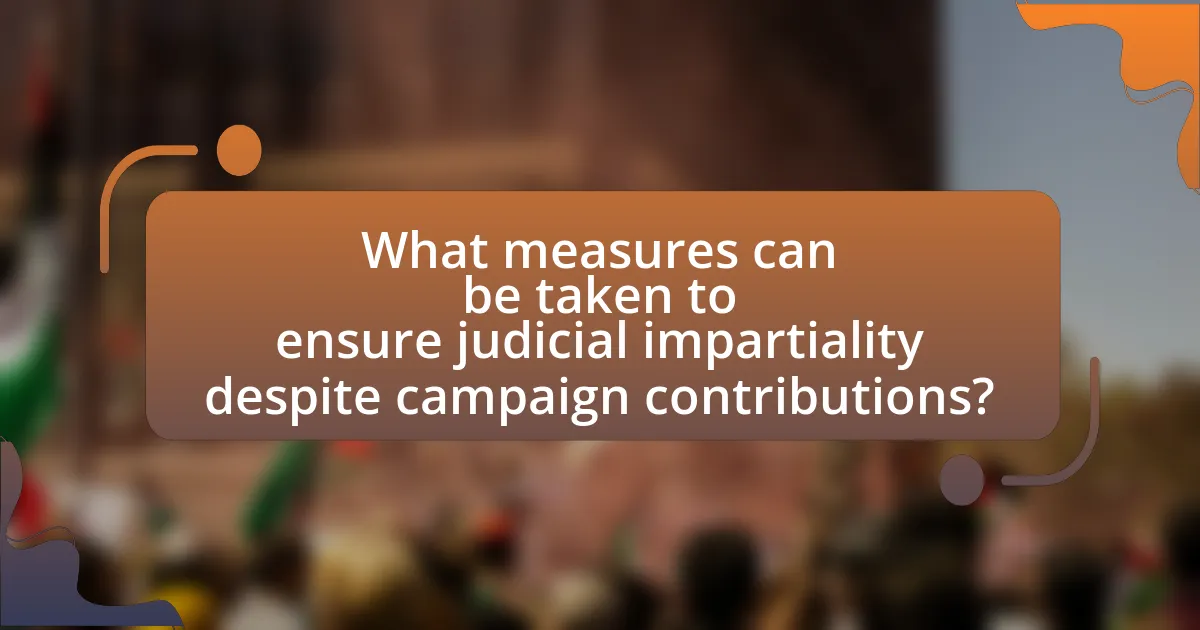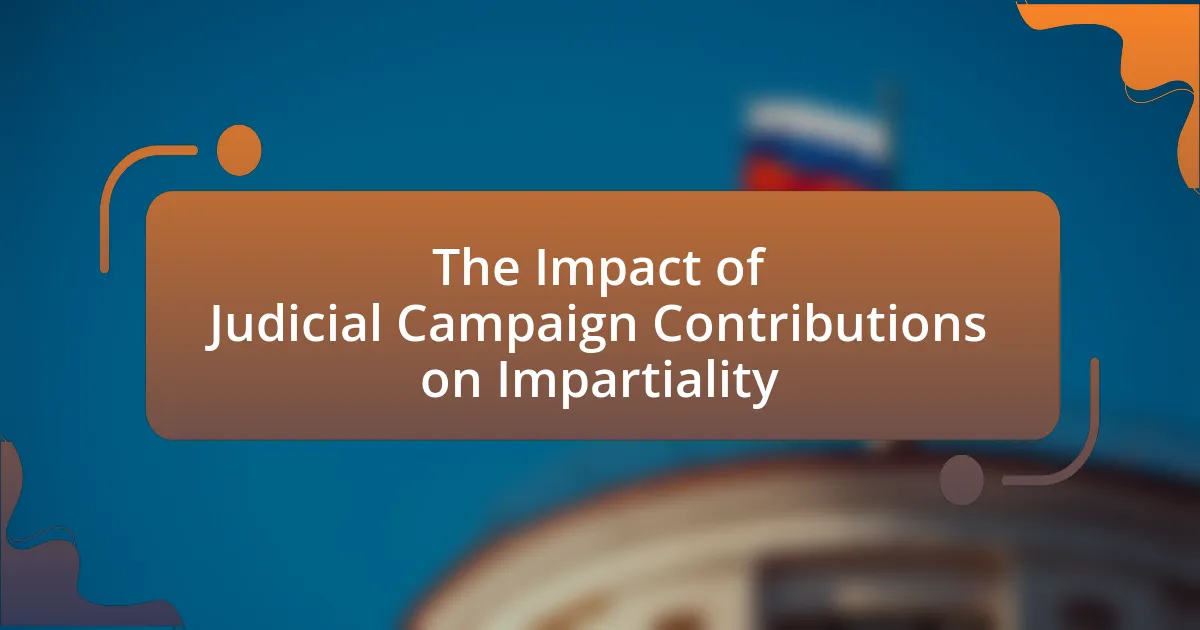Judicial campaign contributions refer to financial donations made to candidates seeking judicial office, which can significantly influence election outcomes and judicial impartiality. The article examines how these contributions create potential conflicts of interest, with research indicating that judges may favor their financial backers in rulings. It discusses the sources of these contributions, the regulatory landscape governing them, and the implications for judicial integrity. Additionally, the article explores proposed reforms aimed at mitigating the impact of campaign financing on judicial impartiality and emphasizes the importance of transparency and public awareness in maintaining trust in the legal system.

What are Judicial Campaign Contributions?
Judicial campaign contributions are financial donations made to candidates running for judicial office, such as judgeships. These contributions can influence the election outcomes and potentially affect the impartiality of judges once they assume office. Research indicates that higher contributions from specific interest groups may lead to biases in judicial decision-making, as judges may feel beholden to their contributors. For instance, a study by the Brennan Center for Justice found that in states with significant campaign contributions, judges were more likely to rule in favor of the interests of their donors.
How do Judicial Campaign Contributions function within the legal system?
Judicial campaign contributions function within the legal system by influencing the election of judges, which can affect their impartiality in decision-making. These contributions often come from individuals, organizations, or interest groups seeking favorable rulings, creating potential conflicts of interest. For instance, a study by the Brennan Center for Justice found that in states with high levels of campaign contributions, judges may feel pressured to rule in favor of their contributors, undermining the principle of impartial justice. This dynamic raises concerns about the integrity of the judiciary and the fairness of legal outcomes, as judges may prioritize the interests of their financial backers over the rule of law.
What are the sources of Judicial Campaign Contributions?
Judicial campaign contributions primarily come from individuals, law firms, corporations, and interest groups. Individuals often contribute to support candidates who align with their values or interests, while law firms and corporations may provide funding to influence judicial outcomes that affect their operations. Interest groups, including political action committees (PACs), also play a significant role by pooling resources to support candidates who advocate for specific legal or policy agendas. According to the Brennan Center for Justice, in 2019, nearly 80% of state supreme court candidates received contributions from lawyers and law firms, highlighting the substantial influence of these sources on judicial campaigns.
How are these contributions regulated?
Judicial campaign contributions are regulated primarily through state laws and federal regulations that govern campaign financing. These regulations often include contribution limits, disclosure requirements, and restrictions on the sources of contributions, such as prohibiting donations from certain entities like corporations or unions. For instance, the American Bar Association’s Model Code of Judicial Conduct advises judges to avoid situations where their impartiality might be questioned due to campaign contributions, reinforcing the need for transparency and accountability in judicial elections. Additionally, the U.S. Supreme Court’s decision in Buckley v. Valeo (1976) established that while contributions can be limited to prevent corruption, independent expenditures cannot be restricted, creating a complex regulatory landscape that impacts judicial impartiality.
Why do candidates seek Judicial Campaign Contributions?
Candidates seek judicial campaign contributions primarily to finance their election campaigns, ensuring they can effectively compete for judicial positions. These contributions are essential for covering costs such as advertising, outreach, and campaign staff, which are critical for raising public awareness and garnering voter support. Research indicates that judicial elections have become increasingly expensive, with some states reporting campaign costs exceeding $1 million, highlighting the necessity for candidates to secure funding to remain competitive.
What role do contributions play in judicial elections?
Contributions play a significant role in judicial elections by influencing candidate visibility and campaign viability. Financial support allows candidates to fund advertising, outreach, and other campaign activities, which can enhance their chances of winning. Research indicates that candidates who receive higher contributions tend to have better electoral outcomes, as evidenced by a study from the Brennan Center for Justice, which found that in states with competitive judicial elections, the candidates who raised the most money were often the ones who won. This financial dynamic raises concerns about impartiality, as substantial contributions may lead to perceived or actual biases in judicial decision-making, undermining public confidence in the judiciary.
How do contributions influence candidate visibility and outreach?
Contributions significantly enhance candidate visibility and outreach by providing financial resources necessary for campaign activities. These resources enable candidates to invest in advertising, outreach programs, and events that increase their public presence. For instance, a study by the Brennan Center for Justice found that candidates who receive higher contributions are able to run more extensive advertising campaigns, which directly correlates with increased name recognition among voters. Furthermore, contributions can facilitate networking opportunities, allowing candidates to connect with influential community members and organizations, thereby broadening their outreach efforts.

How do Judicial Campaign Contributions affect Impartiality?
Judicial campaign contributions significantly undermine impartiality by creating potential conflicts of interest for judges. When judges receive substantial financial support from specific individuals or organizations, it may lead to perceptions or realities of bias in their decision-making processes. Research indicates that judges who receive campaign contributions are more likely to rule in favor of their contributors in subsequent cases. For instance, a study published in the American Economic Journal found that judges who received contributions from businesses were more likely to favor those businesses in rulings, highlighting a direct correlation between financial support and judicial outcomes. This dynamic raises concerns about the integrity of the judicial system, as impartiality is essential for maintaining public trust and ensuring fair legal proceedings.
What is the relationship between campaign contributions and judicial impartiality?
Campaign contributions can undermine judicial impartiality by creating perceived or actual biases in decision-making. Studies indicate that judges who receive significant contributions from specific interest groups may feel pressured to rule in favor of those contributors, leading to conflicts of interest. For instance, research published in the “Journal of Politics” by authors like Michael J. Nelson and others demonstrates that higher campaign contributions correlate with favorable rulings for contributors in subsequent cases. This relationship raises concerns about the integrity of the judicial system, as it suggests that financial support can influence judicial outcomes, thereby compromising the principle of impartial justice.
How can contributions lead to perceived bias in judicial decisions?
Contributions can lead to perceived bias in judicial decisions by creating the impression that judges may favor the interests of their financial backers over impartiality. When judges receive campaign contributions from specific individuals or organizations, it raises concerns about their ability to remain neutral in cases involving those contributors. Research indicates that judges who receive significant funding from particular sources may be more likely to rule in favor of those contributors, as evidenced by studies showing correlations between campaign donations and judicial outcomes. For instance, a study published in the “American Economic Journal” found that judges who received campaign contributions from businesses were more likely to rule in favor of those businesses in related cases, reinforcing the perception of bias.
What evidence exists linking contributions to judicial outcomes?
Evidence linking contributions to judicial outcomes includes studies demonstrating that campaign donations influence judges’ decisions. For instance, a study by the Brennan Center for Justice found that judges who received contributions from attorneys or law firms were more likely to rule in favor of those contributors in subsequent cases. Additionally, research published in the Journal of Politics indicated that higher campaign contributions correlate with favorable rulings for donors, suggesting a direct relationship between financial support and judicial bias. These findings underscore the potential impact of campaign financing on judicial impartiality.
Why is impartiality important in the judiciary?
Impartiality is crucial in the judiciary because it ensures fair and unbiased decision-making in legal proceedings. When judges are impartial, they uphold the rule of law, maintain public confidence in the legal system, and protect the rights of individuals. Research indicates that perceived impartiality enhances the legitimacy of judicial outcomes, as seen in studies showing that public trust in courts increases when judges are viewed as neutral arbiters, free from external influences such as campaign contributions. For instance, a report by the Brennan Center for Justice highlights that judicial elections influenced by campaign financing can compromise impartiality, leading to decisions that favor contributors over justice. Thus, impartiality is essential for the integrity and effectiveness of the judiciary.
What are the consequences of a lack of judicial impartiality?
A lack of judicial impartiality leads to a compromised legal system, where decisions may favor specific interests over justice. This bias undermines public trust in the judiciary, as seen in studies indicating that perceived partiality can decrease confidence in legal outcomes. For instance, a 2018 report by the Brennan Center for Justice highlighted that when judges are influenced by campaign contributions, it raises concerns about their ability to remain neutral, ultimately affecting the fairness of trials and the integrity of the rule of law.
How does public perception of impartiality affect the legal system?
Public perception of impartiality significantly influences the legal system by shaping trust in judicial processes and outcomes. When the public believes that judges are impartial, they are more likely to accept legal decisions and comply with the law, which enhances the legitimacy of the legal system. Conversely, if the public perceives bias or partiality, it can lead to skepticism about judicial fairness, resulting in decreased compliance and increased challenges to legal authority. Research indicates that perceptions of judicial impartiality are closely linked to the integrity of the legal system; for instance, a study by the American Bar Association found that public confidence in the judiciary is directly correlated with perceptions of impartiality, highlighting the critical role of public opinion in maintaining judicial legitimacy.

What measures can be taken to ensure judicial impartiality despite campaign contributions?
To ensure judicial impartiality despite campaign contributions, implementing strict campaign finance laws is essential. These laws can limit the amount of money that can be contributed to judicial campaigns, thereby reducing the influence of wealthy donors on judicial decisions. For instance, states like North Carolina have enacted regulations that cap contributions to judicial candidates, which helps to mitigate potential biases stemming from financial support. Additionally, establishing public financing options for judicial campaigns can further promote fairness by allowing candidates to run without relying heavily on private donations. Research indicates that when judges are less dependent on campaign contributions, they are more likely to make impartial decisions, as evidenced by studies showing a correlation between reduced campaign spending and increased public trust in judicial outcomes.
What reforms have been proposed to address the impact of campaign contributions?
Reforms proposed to address the impact of campaign contributions include implementing stricter limits on individual contributions, enhancing transparency through mandatory disclosure of donors, and establishing public financing systems for campaigns. Stricter limits aim to reduce the influence of large donations on judicial decisions, while transparency measures help voters understand potential biases. Public financing systems, such as those used in states like Arizona and Maine, provide candidates with funds based on small donations, promoting a more equitable electoral process. These reforms are designed to safeguard judicial impartiality by minimizing the potential for conflicts of interest arising from campaign contributions.
How effective are these reforms in promoting judicial impartiality?
Judicial reforms aimed at limiting campaign contributions have shown varying degrees of effectiveness in promoting judicial impartiality. Evidence indicates that reforms, such as public financing of campaigns and contribution limits, can reduce the influence of money on judicial decisions, thereby enhancing impartiality. For instance, a study by the Brennan Center for Justice found that states implementing public financing saw a decrease in the correlation between campaign contributions and judicial rulings, suggesting that these reforms can mitigate bias stemming from financial influences.
What role does public awareness play in reforming judicial campaign financing?
Public awareness plays a crucial role in reforming judicial campaign financing by fostering informed public discourse and encouraging accountability among judicial candidates. Increased awareness of the influence of money in judicial elections can lead to public demand for transparency and reforms, such as stricter contribution limits and disclosure requirements. For instance, studies have shown that states with higher public awareness and advocacy efforts have successfully implemented reforms that reduce the impact of campaign contributions on judicial impartiality, thereby enhancing the integrity of the judicial system.
What best practices can be implemented to maintain judicial integrity?
To maintain judicial integrity, implementing strict campaign finance regulations is essential. These regulations can limit the influence of monetary contributions on judicial decisions, thereby promoting impartiality. For instance, jurisdictions that have adopted public financing for judicial campaigns, such as North Carolina, have seen a reduction in the perceived influence of donors on judges’ rulings. Additionally, establishing clear codes of conduct for judges regarding campaign contributions can further safeguard against conflicts of interest. Research indicates that transparency in campaign financing correlates with higher public trust in the judiciary, reinforcing the importance of these best practices.
How can transparency in campaign financing improve public trust?
Transparency in campaign financing can significantly improve public trust by allowing citizens to see the sources and amounts of funding that influence political candidates and their decisions. When voters have access to clear information about who is financing campaigns, they can better assess potential conflicts of interest and the motivations behind candidates’ policies. Research indicates that transparency reduces perceptions of corruption; for instance, a study by the Brennan Center for Justice found that states with stronger campaign finance disclosure laws report higher levels of public trust in government. This connection between transparency and trust is crucial, especially in the context of judicial campaigns, where impartiality is essential for maintaining the integrity of the legal system.
What steps can judges take to mitigate the influence of contributions on their decisions?
Judges can mitigate the influence of contributions on their decisions by implementing strict recusal policies when faced with potential conflicts of interest. This involves judges stepping aside from cases where they have received campaign contributions from involved parties, thereby ensuring impartiality. Research indicates that states with mandatory recusal laws have seen a decrease in perceived bias, reinforcing the importance of such measures. Additionally, judges can enhance transparency by publicly disclosing campaign contributions, which allows for greater scrutiny and accountability, further reducing the potential for undue influence on judicial decisions.
